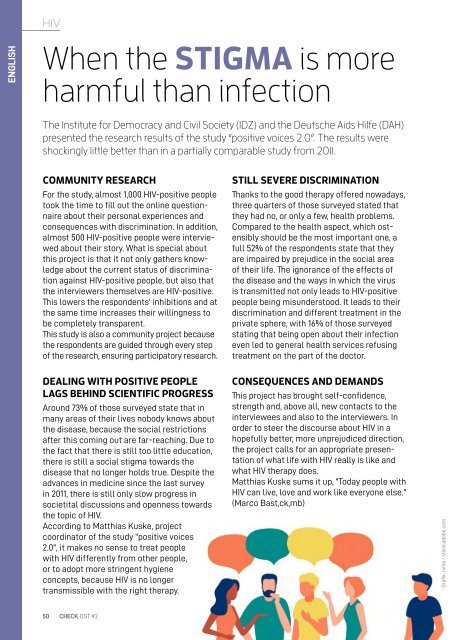CHECK OST#2
Sie wollen auch ein ePaper? Erhöhen Sie die Reichweite Ihrer Titel.
YUMPU macht aus Druck-PDFs automatisch weboptimierte ePaper, die Google liebt.
ENGLISH<br />
HIV<br />
When the STIGMA is more<br />
harmful than infection<br />
The Institute for Democracy and Civil Society (IDZ) and the Deutsche Aids Hilfe (DAH)<br />
presented the research results of the study “positive voices 2.0”. The results were<br />
shockingly little better than in a partially comparable study from 2011.<br />
COMMUNITY RESEARCH<br />
For the study, almost 1,000 HIV-positive people<br />
took the time to fill out the online questionnaire<br />
about their personal experiences and<br />
consequences with discrimination. In addition,<br />
almost 500 HIV-positive people were interviewed<br />
about their story. What is special about<br />
this project is that it not only gathers knowledge<br />
about the current status of discrimination<br />
against HIV-positive people, but also that<br />
the interviewers themselves are HIV-positive.<br />
This lowers the respondents' inhibitions and at<br />
the same time increases their willingness to<br />
be completely transparent.<br />
This study is also a community project because<br />
the respondents are guided through every step<br />
of the research, ensuring participatory research.<br />
DEALING WITH POSITIVE PEOPLE<br />
LAGS BEHIND SCIENTIFIC PROGRESS<br />
Around 73% of those surveyed state that in<br />
many areas of their lives nobody knows about<br />
the disease, because the social restrictions<br />
after this coming out are far-reaching. Due to<br />
the fact that there is still too little education,<br />
there is still a social stigma towards the<br />
disease that no longer holds true. Despite the<br />
advances in medicine since the last survey<br />
in 2011, there is still only slow progress in<br />
societital discussions and openness towards<br />
the topic of HIV.<br />
According to Matthias Kuske, project<br />
coordinator of the study "positive voices<br />
2.0", it makes no sense to treat people<br />
with HIV differently from other people,<br />
or to adopt more stringent hygiene<br />
concepts, because HIV is no longer<br />
transmissible with the right therapy.<br />
STILL SEVERE DISCRIMINATION<br />
Thanks to the good therapy offered nowadays,<br />
three quarters of those surveyed stated that<br />
they had no, or only a few, health problems.<br />
Compared to the health aspect, which ostensibly<br />
should be the most important one, a<br />
full 52% of the respondents state that they<br />
are impaired by prejudice in the social area<br />
of their life. The ignorance of the effects of<br />
the disease and the ways in which the virus<br />
is transmitted not only leads to HIV-positive<br />
people being misunderstood. It leads to their<br />
discrimination and different treatment in the<br />
private sphere, with 16% of those surveyed<br />
stating that being open about their infection<br />
even led to general health services refusing<br />
treatment on the part of the doctor.<br />
CONSEQUENCES AND DEMANDS<br />
This project has brought self-confidence,<br />
strength and, above all, new contacts to the<br />
interviewees and also to the interviewers. In<br />
order to steer the discourse about HIV in a<br />
hopefully better, more unprejudiced direction,<br />
the project calls for an appropriate presentation<br />
of what life with HIV really is like and<br />
what HIV therapy does.<br />
Matthias Kuske sums it up, "Today people with<br />
HIV can live, love and work like everyone else."<br />
(Marco Bast,ck,mb)<br />
Grafik: Iuliia / stock.adobe.com<br />
50 <strong>CHECK</strong> OST #2


















